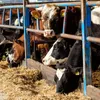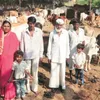Mumbai-based startup Bodhishop delivers desi cow products, ensuring cows are not sent to slaughterhouses
As the government encourages and promotes the use of cow by-products, startup Bodhishop is blazing the trail by ensuring the welfare of the cows as well as having a strong business model.
India is the world’s largest producer of milk. But milk and milk products are also infamous for their high adulteration rate in our country. As per a recent news report, around 68.7 percent of milk and milk products sold in the country are not as per the standards laid down by the Food Safety and Standards Authority of India (FSSAI).
It is to counter this that Rajas Paranjpe (30) founded Bodhishop in August 2018.
The startup is a Mumbai-based marketplace that not only lists and delivers desi cow milk and other products, but also ensures the farmers who sell on its marketplace commit to the welfare of the cows, and not send them to slaughterhouses.

Founders of Bodhishop: Rajas Paranjpe and Gautami Paranjpe
After seeing the good response, he was joined by his wife Gautami Paranjpe (26) in October same year.
According to the founders, the startup sources milk and by-products only from desi cows. The startup is dealing only with desi cows in order to provide healthy A2 milk (A2 protein is found only in desi cows) and its products to customers.
The bootstrapped startup claims to have grown 10X in revenue in the past one year, and has generated tremendous demand for A2 milk, A2 milk products, and Panchagavya items (they are made using milk, curd, ghee, cow dung, and cow urine) in India and across the world. Bodhishop also claims to have reached more than three million people till now.
The start
Rajas and Gautami got married in January 2018. While Rajas initially founded Bodhishop.in alone in August 2018 with limited funds. Gautami also decided to quit her job to join her husband in the business.
Before starting up, both Rajas and Gautami worked in the media. While Rajas had his own firm specialising in making marketing videos for ecommerce websites, Gautami worked in the field of marketing content for different media and PR firms. Rajas also worked with prominent clients such as Google, Sony, and National Geographic in different capacities.
Speaking about what inspired him to startup in the space, Rajas says,
“Three years ago, while shooting for a documentary on prosthetics for heavy animals, I visited a gaushala for the first time where I understood the difference between indigenous desi cows and Jersey/Holstein cows. This was an eye-opener for me. I spoke to the head veterinarian at the Gaushala to understand exactly what was wrong with the cows there”.
According to Rajas, what he noticed was that most desi cows were abandoned by the farmers due to the less quantity of milk they yielded. Some cows were also harmed to scare them off since they were unaffordable to the farmers, and they didn’t want to send them to slaughterhouses.
Being an animal lover, Rajas decided to do something to help make desi cows rearing sustainable.
After over two years of research on desi cows and the benefits of A2 milk, A1 vs A2 milk, etc., he founded Bodhishop.
How does it work
Currently, Bodhishop has a total of seven farms – five in Maharashtra, one in Gujarat and a cowherd community, Dharwad community, which sells through Bodhishop marketplace.

Rajas with cows
All the farms together have about 1,000-1,200 cows. But Rajas says that at any particular time, only 40 to 45 percent are milking. Currently, Gir and Tharparkar cows are the only two kinds of desi cows found in these farms.
Some of the parameters Bodhishop ensures to maintain its quality include: breed of cows has to be indigenous and cannot be crossbred with Jersey/HF cows; once cow stops giving milk, she is not sent to slaughter-house; bulls are not sent to slaughterhouse; organic and nutritious feed is given to cows; and no hormone injections are given to increase yield of milk.
“To ensure quality, all these farms must do their lab report and send us a monthly report. We also plan to do the lab test (in food labs) in third-party labs and both the reports should reconcile in the second phase of our venture. Apart from lab reports, we also do personal visits every two months, check their entire milking process, what precautions are taken by farms, whether udders are also sterilised through an Ayurvedic method, etc.,” says Rajas.
Speaking about the business model, Rajas says, “The average life of a cow is around 25 years. The cow produces milk for up to 15 years. Whether the cow is milking or not milking, it still needs around 50 kg of food per day. To sustain such costs, products apart from ghee and milk must be monetised”.
Challenges
Like most startups, Bodhishop faced its own set of challenges. Rajas says, there was a huge challenge when it came to distribution.
“We get orders for about 2,000 litres of milk (B2C) per day. Our capacity is now 3,000 litres. Balance 1,000 litres is processed for ghee, and we sell about 200 litres of ghee per month. We also sell soaps, milk powder, hand wash, agarbattis, dishwash gel, organic jaggery, and other Panchagavya products," he says.
“In Mumbai, there is a high demand for A2 milk, but investing in logistics is very challenging,” adds Rajas.
Market and revenue
Bodhishop sells A2 milk - raw milk (non-pasteurised, non-homogenised, and not processed under UHT – ultra heat treatment) for Rs 125 per litre. The startup also sees huge potential in the export of such products.
Gautami says, “Panchagavya products (soaps, shampoos, agarbatti, moisturisers, etc) are hugely popular in western countries since they are chemical free with no side effects. In Boston alone, there are over 1,000 Panchagavya centres. We were invited to an international conference in August 2019, where India’s top ecommerce startups, who do cross-border sales that help Indian products reach globally, were invited. Giants like Google, Amazon India, Payoneer, and DHL were present to encourage, mentor and provide solutions for challenges faced by sellers for cross border ecommerce”.
The startup works on a commission basis, and only after a sale is made. It sells all the products at the price that the Gaushala decides. The startup’s commission ranges between 10 percent to 25 percent.
On the marketplace, customers can add the products of their choice to their cart and checkout by selecting various payment options.
Gautami says, “Once the customer has placed the order, the order is packed and dispatched with our trusted delivery partners. For domestic deliveries, we have partnered with FedEx and Delhivery, and for deliveries outside India, we have partnered with DHL”.
The startup claims to be the first exclusive marketplace for desi cows’ dairy farms, but competes with other farms who sell milk through their own portals.
Even ecommerce players like Bigbasket and Amazon also list A2 milk and milk powder for their customers.
Future plans
Bodhishop is now planning to expand its marketplace to reach both domestic and international consumers. It is now looking to raise funds to create its own milk logistics to fulfil the heavy demand for desi cows' A2 milk.
It is also planning to include Khillar, Deoni, Kankrej, Sahiwal, Malnad, and other desi cows in its farms soon. It is already in the process to list a farm in Maharashtra that houses Kankrej cows.
(Edited by Megha Reddy)










